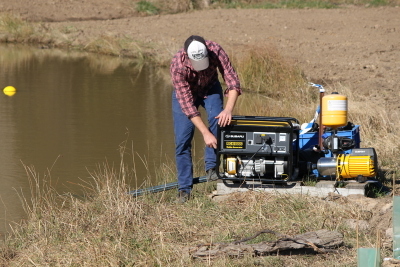You know the amount of power you need. You've decided on diesel or petrol. You even have an idea of which brand you're after. But when faced with generators for sale, there are still some questions left unanswered.
Here we answer the questions you never thought to ask about generators for sale:
1. What type of oil does a generator take?
For most generators you can simply use 10W-30, 15W-40 or 20W-50 engine oil - all are widely available from a Service Station or an automotive shop like Repco or Supercheap Auto. The best thing to do is check the specific recommended engine oil according to the particular make/model of your generator. You can find this in the instruction manual.
2. How much oil does a generator normally use?
The amount varies and depends on the engine model, length of time since the last oil change, amount of power the generator is producing and length of the power outage. Check the manual for a list of required maintenance procedures and schedules. Below is a good video of a customer undertaking an oil change for his inverter generator:
3. What fuel do I need to put in it for petrol generators?
Unleaded fuel carrying a 95 or 96 RON rating will usually be sufficient.
4. Is an earth strap necessary and if so, why is it not supplied?
An earth strap is only required to run highly sensitive equipment, therefore it's not necessary for general purpose use generators.
5. Do I need a generator with a long range fuel tank?
That depends on how you will be using your generator. A long range fuel tank means you can run your generator for longer periods of time without worrying about refilling with fuel. As a comparison, a standard fuel tank might last between 2-4 hours whereas a long range fuel tank means you can enjoy anywhere up to 12 hours of operation. This is particularly suited for sites that need constant power but are located far from an electric source, such as some construction or mining sites. It's worth bearing in mind that some generators can be customised to include a long range fuel tank at extra cost.
6. What is an Automatic Voltage Regulator (AVR)?
Many generators contain an automatic voltage regulator to help the machine maintain consistent voltage output under varying loads. An AVR is designed to prevent voltage spikes and surges that can damage your appliances. It is ideal for when power is needed for more sensitive equipment or to start electric motors. You can choose from both Petrol AVR and Diesel AVR Generators.
7. What is the difference between kW and kVA?
Generator sets are usually shown with both ratings. In technical terms, kW (kilowatt) is the unit of real power and kVA (kilovolt-ampere) is the unit of apparent power. In normal speak, kVA is the total power that appears to be flowing, but it includes the net power that is flowing in one direction as well as the amount of power circulating back and forth between the source and the connected load. The net power that is flowing from the source to the load is the real power, the kW. The difference between kW and kVA is the power factor (pf). To determine the kW and kVA ratio, the below formula is used:
Power Factor x kVA = kW e.g. 0.8 x 6.25 kVA = 5 kW
More questions? Check out our FAQ Page at MyGenerator.com.au
DISCLAIMER* Please note, this advice is general in nature and we strongly recommend consulting the product manual and where relevant, a professional installer.










